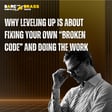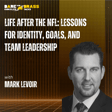Credibility and Personal Identity
00:00:00
Speaker
hair, nails mean a lot to me. And it is a part of my personality, but it is a big reason why when I walk into the rooms I walk into that I'm discredited. Uh, normally if I don't look like my counterparts,
00:00:19
Speaker
most of the time. And it's funny that that quote was from someone over 10 years ago, me. And in the pandemic, it was even more resonated because I could see it on the screen. It was more visual in my face that
00:00:39
Speaker
There's Dave, Tom, James, Matt, Matt, Matt. I didn't have Georges. Sorry, I didn't have any teacher.
Podcast Introduction
00:00:59
Speaker
This is Bare Knuckles and Brass Tax, a cybersecurity podcast that tackles the vendor-customer relationship and everything in between. I'm George K. with the vendor side. And I'm George A., a chief information security officer.
Guest Introduction: Tasha Danos
00:01:12
Speaker
And today we have Tasha Danos, author, podcaster, and security program manager. Today we're going to be talking about some pretty cool topics, including how to actually get career success when you work with a den of wolves and people just trying to take you down.
00:01:29
Speaker
Yeah, Tasha is one of my favorite people. Whenever we hang out, I'm just laughing most of the time, and we get plenty of laughs in here. She talks about authenticity. We touch on imposter syndrome, the difference between mentorship and sponsorship.
Tasha's Career Journey
00:01:44
Speaker
She's had a great and interesting career journey, and it's a lot to learn. Brilliantly technical, incredibly stylish. Tasha Danos, welcome to the show. Hello.
00:01:57
Speaker
Hey, hey, hey, thank you for having me. Yeah, we are very pleased to have you. Let's start where we usually do, which is your quick and dirty story of how you got into this crazy world that is cybersecurity.
00:02:11
Speaker
All right, let's do the fastest way possible. I always hope to be working in fashion or working in television. I thought I was going to be working designing windows for Bergdorf or doing some type of hosting. And that broke my heart because that was not my story. I ended up doing administration.
00:02:32
Speaker
and using my business management degree. And that got me a clearance and working as an administrator in the Pentagon. And I ended up working for a director for ITA, that was Information Technology Agency. And that organization was responsible for the backbones of all of the Pentagon networks in the national capital
Diversity and Communication Challenges
00:02:59
Speaker
And I was working with him very closely. And as I was working with him, he started to ask, like, you seem to understand what this is. And I said, yeah. And it was kind of awkward because he was like, well, a lot of people don't know. I was like, well, I do. And he said, well, do you want to go to boot camp?
00:03:19
Speaker
I said yeah and I went to boot camp and I got my a plus net plus and my security plus and I started to do smaller projects while finding my backfill to work as his admin and I.
00:03:35
Speaker
the smaller projects were like there were system or little things that people weren't responsive didn't they needed to get done but people weren't keeping track of like tenant security plans making sure that the tenants on the backbone were making getting their phone scans patch management and just the health of any kind of system connected and I went to that and I went from
00:03:59
Speaker
doing that for a while, becoming the vome branch chief for vome management for the Pentagon, and then ita and then went to the secret service for a little while, and then to an Intel community, small Intel, we're a SAP, and then
00:04:19
Speaker
Someone called my friend called and said I left the government and that made me very nervous and she actually went to Capital One Went to Capital One doing those kind of things and then went to Google for a little while and now I'm at meta within reality labs, so your the cool meta glasses and all of the physical products and horizon worlds bringing security program management to those things
00:04:47
Speaker
Oh, that's amazing. It's also hardcore and we're going to dig into some layers of that story. Um, but yeah, thank you. Thank you for sharing. I like, uh, I like that you made your bones doing tech debt. Yeah. And, uh, and you know, I think, uh, I've heard that the networks at the Pentagon are fairly important and expansive and I'm sure rife with vulnerabilities.
00:05:12
Speaker
They are, they are. I've heard it's at, I mean, they should be looked after, I will say. They should be looked after. There's a few files on there. I'm sure you watch the news. So there's a few files on there that seem to slip through the hands sometimes, but they should be cared for.
Authenticity and Imposter Syndrome
00:05:31
Speaker
All right. Well, you are a podcast host, but you're also a practitioner, which means
00:05:37
Speaker
I get first crack. So I want to quote from your chapter in Securing Our Future because you are part of the Black Women in Cybersecurity Collective. It's an amazing book. We were fortunate enough to have Shanisa Kambrick on also, and we will have Tanisha Martin and the Black Girls Hack Squad as well.
00:05:58
Speaker
I know so good. But this part in your chapter really stuck out to me. Everyone should get the book. Your chapter is on finding your purpose, which I think you illustrated a little bit here in your origin story. But I want to read this and then I'm going to give you some time to kind of expound on like what that meant. OK, so OK, here's a quote.
00:06:21
Speaker
My voice carries, my nails are long, shiny, and distracting, and my hair is set to change with the swings of my mood. These physical attributes that many would discredit and call frivolous are what sustain my main character. I made a vow to myself that those attributes would never take a backseat during my journey, and I would remain authentically me. So I want to give you the space to tell us a little bit about
00:06:50
Speaker
what that meant and maybe that moment where you felt you needed to make that decision or, or say that to yourself. I will, I will take the moment because I need the moment because, um, that still range true to me today. Uh,
00:07:14
Speaker
My hair is different than it was yesterday. And if you are connected with black women, we have lots of trials with our hair and our hair is an extension and nails. I'm missing them right now and I do feel like I'm missing something. Like if you don't notice, I'm doing a lot of this. It's kind of weird. But for
00:07:39
Speaker
The type of girl that I am,
Minority Representation in Executive Roles
00:07:43
Speaker
hair, nails mean a lot to me. And it is a part of my personality, but it is a big reason why when I walk into the rooms I walk into that I'm discredited. Normally, if I don't look like my counterparts,
00:08:03
Speaker
most of the time, most of the time. And it's funny that that quote was from someone over 10 years ago, me. And in the pandemic, it was even more resonated because I could see it on the screen. It was more visual in my face that there's Dave, Tom, James, Matt, Matt, Matt, fashion.
00:08:31
Speaker
I didn't have Georges, sorry, I didn't have any two Georges, but it was definitely, and I would see myself and I would be like, it would sometimes be, it's alarming still, and I have these conversations, it's funny, I have these conversations with my dad where he's just like,
00:08:50
Speaker
Well, you got to get your degrees and you got to get more credentials, credentials, credentials. It's like, man, credentials ain't going to take away from normally the nails that I have that click, click. Now, this hair that went from a bob that is coming down, swinging down to my butt. You know what I mean?
00:09:09
Speaker
That's who I am. I don't look like you, I don't have experiences like you, but these experiences make me whole, and they make me different, and they make my perspective valued, and I must, like, looking like this, in a world like cyber that is for everyone, needs to be spoken to for everyone, and I'm fighting to make sure that my voice is heard. Love it. Love it.
00:09:36
Speaker
Yeah, that's, you know, what's funny about that. Oftentimes like George and I have this very, very long going like WhatsApp chat going between us, pretty much talk every day on it. From where I sit as a CISO, I get invited to a lot of closed door invitation
Developing Communication Skills
00:09:50
Speaker
only executive tables, right? That's the business. The amount of times that I get invited to tables where, you know, like I'm Arab, like I'm a Palestinian.
00:10:00
Speaker
I'm the only person of color at that table. I'm the only person under 40 at that table. There are definitely very few if not no women at that table. And when you find yourself there as a marginalized person, yeah.
00:10:15
Speaker
We need you, we need more of you, we need more of you to become executives. What you're saying really resonates and it's something like we, George and I take it very personally. It's like very upsetting. We know who the bad companies are. You probably know them too. So yeah, so thank you for that. I think a lot of people are going to resonate with that.
00:10:34
Speaker
I know it's true. I really love your writing in the book, by the way. I love your style. I love your descriptive nature. It's very Hemingway-ish in how you paint a picture. But that's the beauty of it. I can close my eyes. I can visualize. I can see you walk in a room. I can see you sit at the table. I can see and hear your voice without having heard you. You did such a good job with that.
00:10:56
Speaker
Now in that book you stated that your niche was being able to communicate technical solutions to non-technical stakeholders and that was a big key to your success. I've often said the same thing about how I was able to advance so quickly from SOC to CSO in my own career. Given that effective written and verbal communication are considered oftentimes nice to have soft or as we call them essential skills,
00:11:19
Speaker
How would you advise our listeners who are finding inspiration in your story to work on being able to specifically develop those skill sets in their own careers, regardless of the current level?
00:11:30
Speaker
Listen, it's the most entertaining thing to me to talk to a technical person that believes that they're more intelligent than I am because their technical acumen is at a certain level, but can't translate it to anybody. I just sit there and it's like,
00:11:57
Speaker
The reason why I need you guys to value if you can speak and you can write and you can communicate on multiple levels is because as much as people try to devalue you as that being a high level skill for you,
00:12:16
Speaker
They can't get rid of you because
Imposter Syndrome and Confidence
00:12:20
Speaker
your place is so prevalent. Once you find your way in, you got to fight to get in. I'm not going to lie. It's going to be like this. You're going to be uncomfortable. It's going to be awkward. You're going to be in there and they're going to be saying all of these things to you and try to make it sound like you don't belong there. But then once you take the information that they can't communicate, right?
00:12:43
Speaker
They can't communicate the way that you can. And when you say the certain things that need to be said so eloquently to the people that write the checks that matter. Your value is all of a sudden, it's like, oh, like right now.
00:13:00
Speaker
Everyone's starting to understand risk. Risk is a big thing. The more regulations and things that are coming out, the more tech becomes every part of our lives. The government's not there, but as soon as they start catching up and regulations start catching up,
00:13:20
Speaker
there's going to have to be someone that understands how to read the things that have to be done and tell the people that are doing them how to do that effectively to check a box, right? So if you understand how to be that translator back and forth, you're going to go through some hell at the beginning. But in the end, you're going to be the most valued person in the room. Yeah, you know,
00:13:45
Speaker
It seems a lot of people who come in, maybe it's just my circle. I feel like a lot of people enter cyber through pen testing, right? Like they do the boot camp and once they see the machinery behind the screen, they're like, oh, I can play with that. I'm in the matrix. I can make it do what I want. Whatever. And then there's the thrill, you know, of hacking the box or whatever. But I think like if you can't do a write up,
00:14:11
Speaker
of how you got in and why it matters. Like, let's say you are on a hack the box CTF or something. If you take the moment after you do it to like summarize it and try to explain it to like your mom, that's probably a really good double skill set to develop. Because if you can only sort of nerd out on the jargon about what shell you deployed or whatever to escalate privileges, like, all right, cool, and the gang, but you're gonna always hang out over there.
00:14:41
Speaker
And it's really hard to get where George is where you are. Right. So I don't know. It's just, I don't think that's a fun exercise, but you should definitely, definitely try it. Um, I like that to pass it on, to try to explain what you just did to someone like your mom or a kid. I think that's major. That's, that's the secret to how I used to do consulting and sales. So yeah. Spill the beans.
Arrogance in Tech Culture
00:15:22
Speaker
started from a position of power, right? We start with the authentic self. We started with this skill set. But as you point out in your chapter, imposter syndrome creeps in. And as you rightly point out, if you are the only person in the room who looks like you, it's probably compounding that imposter syndrome, right? And you write,
00:15:35
Speaker
I'm a very off the boat Arab mom with her functional grasping. Love you, mom. I love you.
00:15:45
Speaker
I love the way you phrase this. Those of us striving to be better tend to be too hard on ourselves.
00:15:53
Speaker
So also want to give you a moment to sort of like reflect on that. And I guess what you learned about, cause this is probably a continuous thing. I feel like we all face. Oh yeah. I mean, today it's every day. I mean, I know, I know it's, it's not every day. I take that back. It's not every day, but it's a lot. It's a lot. And it's, it's when you're dealing with, um,
00:16:15
Speaker
Normally the challenge starts when you're encountering new people that have to get over the fact that I look like that's the biggest part, you know what I mean? And then there's you you you're constant this battle of trying to explain to people that I do know what I'm talking about. I kind of did this before. I do know what I'm talking about. It's like sometimes I feel like I'm riding a bike.
00:16:40
Speaker
Right. This is going to sound crazy, but this is literally how I feel right now. And then somebody is just like always shaking the handle. You know, when like a bully kind of come shakes the handle and you're like, oh my God, OK. But I can still ride this. I do ride this. Can I ride this bike?
00:16:56
Speaker
And I like that's kind of how I feel or sometimes they're pulling the seat and it's just like I'm like pedaling and I like no I can freaking ride this bike I'm capable of doing this but it's always it is a constant it's a constant thing of me having to be like nah
00:17:12
Speaker
Excuse me, I am that bitch. I have to look in the mirror and be like, you are that girl. You do know how to do these things. You have been in harder situations than you're in right now. And you've talked to, you've had nastier things said to you. And you do may expect that it should be over by now, but hey, it's not over. So. Yeah. And I also want to, you know, if we can
00:17:39
Speaker
go into a little bit of the social science, right? Like the human brain is evolved to fit into a social setting and I think it's perfectly natural to feel that imposter syndrome because if you're looking to the social setting and you're not getting the feedback that you are part of the tribe or you are part of this pack, then it wobbles you, right? And I think that's natural. So I think it's
00:18:04
Speaker
really important that you have that centered sense of self that you can fall back on, because if you don't have that healthy amount of ego, then that wobble is going to knock you off that off that bike. That is more than true. Yeah, I think it kind of kind of speaks to what I want to ask you about, because, you know, in our industry, regardless of whether you're a public sector commercial,
00:18:31
Speaker
It is highly, highly competitive. The more specialized you get, the higher up you go. It's a very doggy dog.
Emotional Intelligence in Cybersecurity
00:18:38
Speaker
If you're lucky, you're in a good organization with a good culture and you're working together.
00:18:42
Speaker
But I've also worked in a lot of big consulting snake dents, you know, or wolf dents, if you will. And, you know, it sounds like you've worked through a lot of dens of wolves. So let's talk about that for a second. You talk about the haters you had to fight through during those early years in cyber, quite compellingly. By the way, I really recommend everyone buy this book.
00:19:01
Speaker
Do you think we, as a society, as an industry, will ever reach a point where arrogance is not like the white elephant stench in the room when someone from outside the box has value to contribute? Or is this just the human condition and will always have to be training our peers who are from marginalized communities to expect and overcome such pointless blue team friction to their own desired and deserved success?
00:19:30
Speaker
Ooh, can we just take a minute and listen to that question? That was beautiful. You talking about me, that was poetry. Do I think we'll ever get over it? No, no. I think it's human nature. I think it's human nature. I think there's two layers to it, at least not while I'm alive. I hate to say that. I don't think I would say
00:19:57
Speaker
No. I don't dream to see that. I don't see that happening. I think it's human nature to be arrogant. I think it's human nature to be like, I know this, I'm better than you than I know this. But I think
00:20:12
Speaker
uh, cultures, our cultures, like you said, working cultures cultivate that. Right. And I think in some places it cultivates it to make better things. They think that, that, that doggy dog world makes us, that competition makes us better. Um, I, I'm, I'm gonna probably, I will say I don't believe
00:20:39
Speaker
Yeah, no, I don't see it. I don't even dream for that. I wish I could, but it's so far away. I don't even dream. Yeah, because I think it also comes down to power, too. It's not just what you look like. I mean, the most depressing thing is when.
00:20:53
Speaker
you hear about like women, for example, like cutting down other women and I'm like, stop it. Because when you do that, they win. But but the but it's a scarcity. It's like the it's a fear of like, well, I have the power. And if I share it, then I will have less of it.
00:21:09
Speaker
Yeah. The way that I look at it is they'd see Tasha's style, right? Yes. As something different. So they'd see that because they don't understand it. Word. They're so rigid in their way. They see it as a target because they don't understand it's a strength. It's like not recognizing a sword for a shield and running headlong into it. Yeah. Because someone strong like her is not going to care because it detracts from the actual point. But I'm just saying that
00:21:34
Speaker
I think the beauty and the real brilliance of what you've done is that you have empowered through differentiation in a world where we are beaten down into being the same. Yeah, man. Thanks. Yeah. Yeah. Own that. Own that nonconformity. It's exhausting. It is exhausting. It's exhausting being like sometimes you do just want to be like,
00:22:01
Speaker
I'm not going to lie, like I'm a military brat and I moved a lot.
Exploring Cybersecurity Roles
00:22:05
Speaker
So I had to learn, like you said, that human nature, like I fit in, I fit in. Oh, I'm over here. Like I fit in. I've learned to fit in quickly. But when it doesn't feel like it's working, I'm just like,
00:22:16
Speaker
What do you mean? I'm cool. How do you not, how can you not tell? What do you want? What else do you need? We're not the same, but damn, you know, that's a, that's very real. All right. Well, we're going to take a quick break and we will be right back.
00:22:40
Speaker
Thanks for listening. We're grateful that you give bare knuckles and brass tacks your time and attention every week. If you dig the show, we have a new way for you to support by becoming a member. Lend your support in the form of a one-time donation or join one of our membership tiers starting for as little as $3 a month.
00:22:57
Speaker
Each membership tier comes with benefits, including exclusive swag, shoutouts, and even the OG Fist and Bolt snapback hat. Any support helps offset the cost of producing the show, and we can do more fun things like contests, giveaways, and more. You can find the link in the show notes, and thanks again for listening. Now back to our conversation with Tasha DeNose.
00:23:24
Speaker
Natasha, you also write, and I feel like half this interview is me just quoting you back to you, but that's how much I like the chapter. I really like this. I think this is one of the most important sentences in the chapter. You write, as my father says, I was preparing myself for the opportunity before it presented itself.
00:23:44
Speaker
This is in the context of your origin story where you felt like you were doing one thing and then when you ended up in administration, I think looking back, as we all do, you realize that the lessons you learned in customer service, the lessons you learned in these other disciplines, they all kind of stacked up into the skill set that you were able to leverage that you didn't have.
00:24:06
Speaker
My question for you is kind of cert acquisition versus these skills and communication question, because I think a lot of newcomers go on a tear and they tend to try and specialize very quickly. Like someone's like, oh, I'm super into cloud. And then they go after like every AWS certification. And they just, and part of me fears that specialization to that degree, because if you haven't even gotten, you've not clocked enough
00:24:34
Speaker
hours or reps in the job. Like maybe you just devoted a lot of time and you don't even like that. But anyway, that's one thing. So how do you suggest people hone some of these skills that you identified that were relevant for your experience? Like you say customer service. So that's sort of like, you may not get it cyber warrior, but if you go work in retail, you're going to deal with some people
00:24:56
Speaker
you know, I don't know, just trying to I'm trying to make it more intentional. Yeah, yeah. So, I mean, one of the biggest things for me is emotional intelligence within cybersecurity. And I think that is my up is that I have lots of emotional intelligence due to all of the different places that I have connected to in my previous lives.
Mentorship vs. Sponsorship
00:25:19
Speaker
that they are skills that you can work on on your own. The first is just start it with the people that you know.
00:25:29
Speaker
Take a moment and listen in the relationships that you have. Do exercises with people that you know, like your girlfriend, your boyfriend, your friends. Listen a little bit. Start reflecting a little bit more. The more you build up on your emotional intelligence when you're in these different conversations, if you are technical and have emotional, like if you have technical IQ and emotional this EQ,
00:25:55
Speaker
that is really what is taking me. Being able to communicate the things, being able to be in high intensity situations like I'm not a SOC analyst, but I'm working with SEBS and not in my current role right now, but in previous roles, but working in incident response where things can be very
00:26:17
Speaker
and have a lot of pressure on you. But understanding, okay, let me back myself up. Let me look at the evidence. Let me understand what's going on in all of the aspects here. That is from all of my previous jobs being able to like a crazy customer comes. So I have these
00:26:38
Speaker
actual life, real life things, but the real life things just come from how do you understand people? How do you listen to people? Like normally you are the person you are at work, at home. So spend some time with the people that are around you and start building up those different skills just as a human and you will be able to translate that to work. Yeah. And I also think you had a keen eye for observation, right?
00:27:05
Speaker
really liked where you wrote that you watched your boss. You watched how your boss, you know, might've convinced people to do XYZ or move to this priority, but you were, who's the person in charge? I want to watch what they do. And sometimes that's something you emulate and sometimes you learn what not to do because maybe it blows up in their face, but you got to watch, you got to pay attention.
00:27:28
Speaker
Yeah, that is key. I would say watch everyone. Watch who matters. Watch who's giving the most feedback. Watch who's the most effective. Watch who has the most influence. Watch who's programs get presented and they actually get actioned on and reflect a little bit. Yeah. I mean, similarly, be mindful of those that aren't clapping when something good happens to you too, right?
00:27:58
Speaker
that part. You wanted to get a little deeper? That's a whole different show. I could play that game too, my friend. But yeah, I feel you. I feel you on this. I worked in bars for like 10 years. I think I recommend everyone get a service job. Yes. Yeah.
00:28:16
Speaker
The parallels in our lives are eerily like I was in I was in retail for a long time. You have to deal with some crazy people. Our previous guest, Kenneth Ellington, was working the sandwich counter at Publix and was basically just was like I had to deal with people who just like throw their sandwich back at me. And so you have to realize like maybe they're having a bad day. I don't know. I thought it was very valuable. But yeah, you get people who just want to like treat you like trash just because they can deal with that.
00:28:45
Speaker
Yeah, shout out to Kenneth, that dude's brilliant. Hey Kenneth, let's talk cyber and security ops for a moment. I love 11 Nerd now and we have practitioners on, it's like sweet. So solid sales three quarters of the time. I've always been of the belief that success in our industry on the practitioner side must be built on a foundation of never-ending curiosity. But it seems that professional opportunities were what drove your rather headfirst dive into SecOps.
00:29:12
Speaker
When it comes to formal training versus curiosity gain skills, like let's say playing around in your own time with test VMs or Kali
Strategic Career Advancement
00:29:20
Speaker
Linux, for example, which do you think folks should put more priority into if they want to get into this, like doing the train stuff or just getting curious, getting freeware tools and just messing around? I have a little bit, um, kind of going back to what George was saying earlier about how people just dive in and get so specific.
00:29:44
Speaker
Like cyber tech is an ocean as corny as it sounds like a lot of people want to just boil the ocean. They want to come in and they want to come in strong. I think you should just explore like if you if they're Google in your town meetups.
00:30:00
Speaker
start talking to different people. That's like the first thing. Then if there's not meet up, some some places have hacker spaces like Baltimore has a cool hacker space where you can learn from people that are on Cali like learn how to use the tools. I'll learn how to do a lot picking and maybe like physical security. Like there's so many different things. I would suggest experiencing people first, having an understanding of, OK, go to a conference.
00:30:30
Speaker
Go to a conference a cheap one i wouldn't spend i like i would go to like a b side yeah in your town like b size charm city right there in baltimore for example he says are way better anyway but yes exactly i would go to like a b sides or something like that start engaging with people and figure out like.
00:30:48
Speaker
If you're a very technical person and you wanna get more into it, then that's where start downloading some things, playing in virtual spaces, making some friends and building your relationships there. Maybe you're not, maybe you're on the governance side and you love policy and that's a thing for you. Or maybe you're a little bit of both and you might wanna go into like, you know,
00:31:15
Speaker
and you want to understand like tenable, some of the products like tenable, you know what I mean? So it's like, to me,
00:31:26
Speaker
I really suggest before anybody gets deep on any type of path is just explore as much as you can and don't get overwhelmed. Just feel like find what resonates with you. Find your people and then allow yourself in the space of your people to then find an easier path to start just taking. And don't get assert if you do not, don't get assert.
00:31:53
Speaker
before you even have talked to 15 people, I would say 15, you better get a, get on some people, like 15 people's calendars before you go sign up for a CEH. Yeah. Because you sign up for a CEH and then you don't even know what it is and what that can bring to you. And you you're out what $500 and a bunch of study time and jobs. Some jobs aren't even looking for that. Yeah. Yeah, for sure. Yep.
00:32:22
Speaker
Happy to say that ISC squared or DC council will not be sponsoring this show, but I agree with that. Yes. Yes. Yes. Yes. But get a cert when it's time. Get a cert when it's time. I have lots of cert. Get a cert when it's time. They matter. Yes. Yeah. I think, I mean, also for anyone listening, do you know what's really good at specialized tasks? Artificial intelligence.
00:32:50
Speaker
Uh, with a computer, you know, so the more multidisciplinary understanding you have, the more valuable you're going to be to any organization. And I would encourage everyone to read this post Google.
00:33:08
Speaker
NVIDIA Red Team methodology, and their approach involves, sure, offensive engineers, but it also intimately involves their GRC team, machine learning engineers, like the whole team comes together to check their math against each other, and they all know what each other is doing, and I think that's just an incredible paradigm. But I digress.
00:33:30
Speaker
I want to talk about mentorship versus sponsorship because I think that this is a misunderstood topic. I think a lot of people think, oh, I need to find a mentor and they're going to just download their information into my brain and give me a job. You do make the critical distinction in your chapter of calling your former boss at the Pentagon a sponsor because he was advocating for you. I'm not just teaching you, I'm putting you forward.
00:34:00
Speaker
So, I guess I would like you to talk about the difference between those two and then also what you think the mentee or the recipient needs to bring to the table, right? Because this is like a two-way street.
00:34:13
Speaker
Okay, so those are our three major common things that I must respond to.
Effective Management and Leadership
00:34:23
Speaker
First, a mentee. Let's start with a mentee. Everybody wants a mentee. I learned this the hard way because even I thought, oh, I need a mentor.
00:34:34
Speaker
And I, you know, you you seek out people and you don't register like normally the person that you're seeking out is busy and has a lot of things. That's why you're seeking them out. You're like, ooh, that person looks cool. I want them to tell me all of the things that they did to be where they're at.
00:34:56
Speaker
mentees also need to be understand like they need to understand that it's a it's almost like a part-time job being a mentee right I have a friend that refuses to be a mentee because she's like I don't want any requirements
00:35:10
Speaker
I already go to work. I don't want any extra requirements to become a mentee. You are signing on for extra requirements. You're normally signing on to homework. You're, you're going to a person to learn from them. So you have to be willing to open yourself up to, you may end up having to read extra books. You may end up having to connect with extra people and do all of these things while providing some type of, um, uh,
00:35:42
Speaker
How do I say? It's a back and forth relationship normally, and you have to be aware of that. With mentorship, this is a person that is
00:35:57
Speaker
wants you to understand how to hone your skills, wants you to understand the environment that you are stepping into and wants to prepare you for this. It's like they are going to be watering you and it's this symbiotic, that's the word I'm looking for. It's a symbiotic relationship where I've heard a lot that mentors, when you're mentoring someone, you normally
00:36:21
Speaker
Level up in your career because that person is also you're also being held accountable For being a better person because you're teaching someone right so mentor out there a sponsor Can be one of those things a sponsor can be a mentor but a mentor is not a sponsor and It's the difference between
00:36:48
Speaker
somebody telling you when to go get gas and someone actually being able to put gas in your tank. Like a mentor tells you, okay, you're running out of gas. You need to make sure there's gas stations here, there, there. A sponsor will say, here's $5, go fill your tank up.
00:37:08
Speaker
You know what I'm saying? A sponsor is talking about you in rooms that will get you to the next level. A sponsor is saying, hey, I have a meeting. You come with me. You meet Jack. Jack has got job openings. These are the things that you say to Jack so you can get the job. A mentor is like, they have meetings here and you should probably find a way to get into those meetings because those meetings are a good way
00:37:34
Speaker
for you to get to the next. Yeah. So it sounds like when you're working with a sponsor, you also have to be very clear on on what you want. Right. Like they if they're going to speak on your behalf, you got to be like, I am really into this. Please help me get to this.
00:37:48
Speaker
sponsors are rare as well, too. I've seen there's a lot of people you will find a mentor before and I don't want to ruin anyone's dreams, but I believe like you find mentors before you find sponsors because especially depending on what level of career you're in as well. Yeah, I really like that you make the distinction that a mentee is work because I think a lot of people are like, oh, I'll find a mentor and they're just going to help me find a job. It's like, no.
00:38:16
Speaker
And I know several people who will use that as a pressure test to like, basically see how serious is this person? Because if they, if it's like, go do this, this and that, and then you didn't do any of it, I was like, well, I don't know how serious you are. And I got limited time. So what do we, what do we bring into this party together?
00:38:37
Speaker
Yeah, there's something to be said too for like the coaching approach. Like I like doing the coaching approach, both with the team, like that works for me. And then I have a bunch of people that I kind of, I guess you could say mentor throughout the field. I don't really like prescribing, like do this, do this, do this, do this. It's more, what do you want to do?
Podcast Conclusion
00:38:54
Speaker
And then like on a goal by goal basis, kind of trying to coach them through the logic for them to come up with their own conclusions. Like they're smarter than me. I'm just there to shine the light.
00:39:04
Speaker
But yeah, so actually, to kind of go into my brass tacks question, I want to ask just out of respect, just so I understand the context of your career experience, have you been a team lead with direct reports before? Yes. Okay, perfect. So for folks who, especially I say this for folks who come from marginalized communities, whether they're people of color, women or queer folk, whatever it is,
00:39:31
Speaker
You're making it in the industry, you're starting out, let's say you land that first job, right? Whether it's on a team or whether you're in an individual contributor role, like a consultant or something like that. Where do you see the path to, I'll say the easiest road to climb the ladder on for folks? Should they focus on really finding the best individual contributor roles to really spring roll themselves up?
00:39:54
Speaker
Or do they want to get to a point where they serve their time at a team level and then they try to take over like, or I shouldn't say take over, but to take leadership of a team and then become leaders of people, right? And then managing and all the things that come with that from a business level as well.
00:40:10
Speaker
Because I always see the conflict between the individual contributors and that's what they do. They're individual consultants, they're resources, and they will not take ever, ever. They don't want no reports, none of that, no HR. And there's people who just, they thrive in a team environment and they have to be dealing with people. I think it's almost two cuts of the cloth here. What do you recommend?
00:40:34
Speaker
Oh, it is a personal thing. And it is, to me, management is very personal, right? I believe that if you become a people leader,
00:40:50
Speaker
you need to understand people. And a lot of times for those managers out there that keep losing people on their team, it's because people don't leave jobs. They leave their manager. I didn't want to, I'm not shooting the shot at anybody. I'm just saying, if you have people under you and they keep disappearing, I think you need to do some introspection because, uh,
00:41:20
Speaker
People were individuals, right? And if you are a person that doesn't understand that multiple individuals are coming to you to do, and they might all be doing similar work, we'll just say, phone management. All these individuals are coming to you as individuals to do similar work. You have to manage them as individuals to get the same level of work.
00:41:46
Speaker
Right. So you may have that there's going to be like we'll say you have a team of 10. I've had a team of 10. Right. There's one or two people on that team. You don't have to tell them one thing that you you say, oh my gosh, it looks like the sky is it's raining. They've got umbrellas. They've got jackets. They've got everything that you need. It is ready to go. You don't have to tell them anything. They are on the move.
00:42:11
Speaker
Then you've got, you're going to have one or two people that you can be soaking wet and drowning because the rain is coming down so strong. You are no longer, it's a tsunami now and we can't go inside and you will still have to say to them, please.
00:42:29
Speaker
get me a raincoach and they will still be like and you could have told them where the coats are multiple times and they will just be like well where are the coats again you know that's that
00:42:44
Speaker
And then there's the there's the six people in the middle that you're going up and down with. Like sometimes you can tell them sometimes you don't. Right. But that is management. That's effective management. If you don't understand how to do that and that is not intriguing to you, then go be an individual contributor and rock that ladder. And congratulations to you on on on working on your own alone.
00:43:10
Speaker
very well, but it is a personality thing. Everybody is not meant to manage people. I love that. Yeah. So you got to have real external emotional intelligence. You have to have your own emotional intelligence and know yourself.
00:43:26
Speaker
that part. I like it. George, this is awesome. Tasha, thank you so much for the time. I know we rescheduled on you in a hurry. We were supposed to do this in April, but I'm so glad we got to talk now. I love talking to you. We could hang out all the time. I laugh so much when I'm around you, so thank you for joining us.
00:43:47
Speaker
Same here. I'm so glad to be a part of this. I love, this is my favorite thing to talk about. And I'm so glad you guys read the book and you enjoyed the book. I'd like, and it, oh, also shout out to my podcast. I've got so many things I want to do.
00:44:05
Speaker
I was like black girls and I was like, yes, black girls in cyber, black girls in cyber. That is we are having a summit in Atlanta June 6th through the 9th. Come out there. We just want to support you at every level that you are to feel comfortable, learn and explore yourself. It's a great going to be an intro summit that you will have hands on learning from kind of like what we were just talking about with B-Sides.
00:44:33
Speaker
Black Women in Cyber Collective. I love y'all. Everybody just go get the book. It's so cool to be like you guys reading those quotes back to me and then having
00:44:45
Speaker
knowing the women that I'm in that book with is just, it makes me feel so empowered every single day. And then my Do We Belong Here team at Cyber Florida, Pam, Serena, Rex, man. Yeah, Pam Lindemann, shout out. She is an awesome lady. Yo, Pam's a homie. Listen, Pam, she's one of those people. It's so funny. Pam doesn't even know
00:45:11
Speaker
what she is. Have you ever met a unicorn and they're just like walking around, you know, and they're just like, you're like, Hey, did you know you're a unicorn? And they're like, well, what's a unicorn? You're like this special creature that no one else is like, are you not registering? She's like, no. And then she like flips her mane. She's so amazing. She is an incredible person for sure. Yes. By the way, before you go, where can people find your book? Where can they buy it?
00:45:37
Speaker
Oh my gosh, yes. Amazon, if you like a Kindle and you're not a book holder like me and you just want to swipe on your phone, you can go to Amazon and then you can get a soft back from Amazon as well. But if you want that hardcover, you're sturdy and you want to just carry it with you and pass it down to your children, go to Barnes and Noble. So it's a black woman cyber collective, the brilliance and resilience.
00:46:03
Speaker
outstanding. Thank you. Yeah, absolutely. Thank you guys. I appreciate you having me. I'm glad you allowed me to tell my story and express to people who I am and my thoughts. Absolutely. We will talk to you soon.
00:46:18
Speaker
That wraps up this episode of Bare Knuckles and Brass Tax. If you like this conversation with Tasha Danos, check out our past interview with Tara Cook. Consider leaving us a rating on Spotify or Apple podcasts. It helps others find the show. New episodes of Bare Knuckles and Brass Tax drop every Monday. Listen and subscribe. We'll catch you next week, but until then, stay real.




















